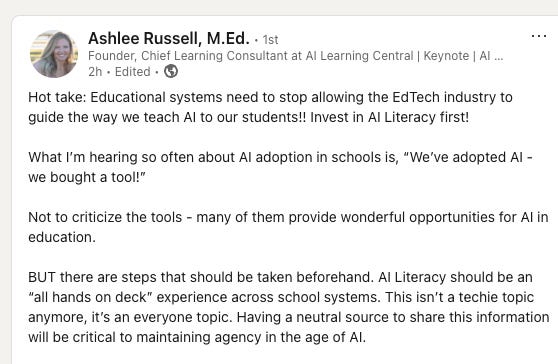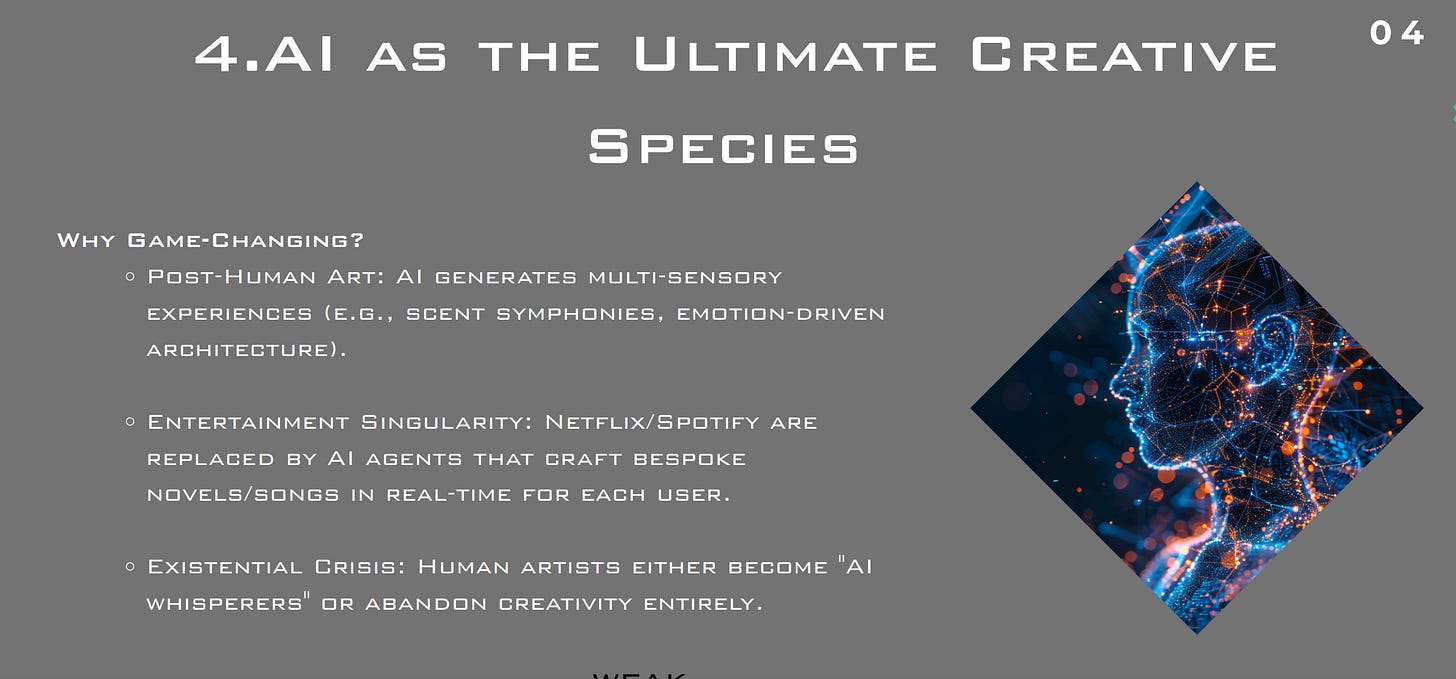EdTech Tools Alone Will Not Prepare Students for an AI World
The new world isn't the current world with AI interjected into it.
Yesterday, Ashley Russel posted on LinkedIn —
I hear the same as well — “We’re all set with AI; we bought Brisk, Magic School, School AI, etc.”
I have nothing against these companies. Their tools help teachers save a lot of time, introduce them to the power of some AIs, and provide organized platforms for classroom use.
But they aren’t designed to help students prepare for a world where machines will be able to do all or nearly all knowledge work as well or better than humans. And that’s just “digital” AI; we also have a world of physical AI where machines will be able to do a lot of human labor as well.
That’s already starting (driverless cars, humanoid robots in car factories).
Beyond work, there are challenging issues related to how we will generally interact with AI, use it for emotional support, date it, marry it, use it to kill, and use it to govern.
This will create a radically transformed world. The new world won’t be the current world with AI interjected into it.
There are way to many specific things we need to be working on with students that AI Edtech tools aren’t designed to do.
The tools aren’t designed to help students understand that they will build relationships with artificial humans and that they will work with them for the rest of their lives.
The tools aren’t designed to help students understand how the integration of intelligence into their own minds will turn them into intellectual superhumans.
The tools aren’t designed to help them understand that many of the jobs that exist today, even marketing, some legal work, accounting, some teaching, and even a lot of medical diagnoses may very well not exist in a few years.
The tools aren’t designed to ensure students understand the power structures, economic forces, and societal shifts that AI is accelerating—and how they can shape their future rather than be shaped by it.
The tools aren’t designed to help humans understand how core human comptencies will be challenged.
The tools aren’t designed to prepare students for the impact of AI on warfare, where autonomous weapons, cyberattacks, and AI-driven military strategies will redefine global conflict.
The tools aren’t designed to help students live in synthetic realities that are indistinguishable from take realities.
The tools aren’t designed to help students grasp how AI will reshape economies, concentrating wealth in fewer hands, displacing entire industries, and forcing nations to rethink economic policies, taxation, and employment models.
They aren’t designed to help students understand the political transformations AI will bring—how it will be used to monitor public activity.
Because that kind of AI literacy isn’t just (or even primarily about) using AI—it’s about understanding and navigating a world transformed by it.
And it’s about developing the “soft” and meta cognitive skills needed to thrive in a world where machines are better knowledge workers than humans.
Researchers who have studied AI their whole lives do not think that students using an AI chatbot is a meaningful strategy for preparing for an AI-driven world.
The people who actually build these systems understand that true preparation requires something much deeper—students need to develop metacognition, communication, collaboration, entrepreneurship, and adaptability. These are the skills that will collaborate with AI, giving them a chance to navigate a workforce where knowledge work is automated and where the ability to think critically, ask the right questions, and build meaningful human-AI partnerships will be key.
So yes, it may make sense to purchase school AI systems—even while recognizing that students are already using more powerful AI models on their own devices. But let’s be clear: that’s maybe 5% of what we need to truly prepare students and faculty for a radically transformed world. The other 95% is about rethinking education itself—helping students cultivate the their individal abilities that will remain valuable no matter how advanced AI becomes and provide them with the best opportunities to work with AI systems.
The first step is helping them to understand what is coming and what is already here.
This is what AI literacy is; it’s not just giving them a text chatbot that’s often worse than the one they have on their phones.
PS. Most of our students are young. They will come of age in the world of a PhysicaGPT9+
Maybe even PGPT20.
And, yes, we can tell them to figure it out on their own, but then don’t complain when they disengage from school.
PPS. This is not the future








